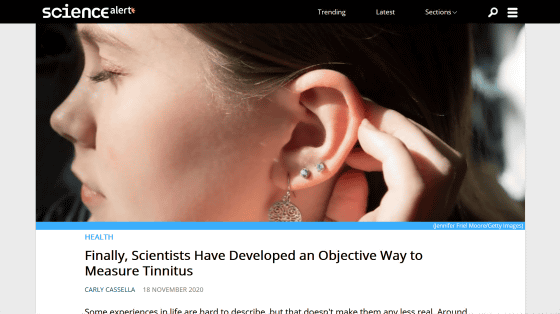Scientists develop methods to objectively measure 'tinnitus' that can only be heard in an individual's head

'
Objective measurement of tinnitus using functional near-infrared spectroscopy and machine learning
https://journals.plos.org/plosone/article?id=10.1371/journal.pone.0241695
Finally, Scientists Have Developed an Objective Way to Measure Tinnitus
https://www.sciencealert.com/scientists-have-discovered-a-way-to-objectively-measure-tinnitus-in-the-brain

It's difficult to explain to others about tinnitus, which is a personal experience, but that doesn't mean that you can't hear tinnitus. It is said that 10% to 20% of adults worldwide suffer from tinnitus, which is a major problem that threatens the quality of life.
In recent years, advances in
In 2014, fNIRS was used to investigate the brain experiencing tinnitus for the first time, and it was found that blood flow in the auditory cortex in the right temporal lobe increased during tinnitus. .. Further clinical studies have shown that the frontal lobe and some visual processing areas other than the auditory cortex also have increased blood flow during tinnitus.
In addition, a 2017 study using fNIRS showed that tinnitus was associated with altered connections and increased neuronal firing in specific brain regions. These results have also led to the development of a potential treatment that 'reduces tinnitus by stimulating the brain with an electric current.'

While scientific research on tinnitus is advancing, there has been no clinically usable 'measure of tinnitus objectively', so patients who complain of tinnitus are always diagnosed based on subjective reports. I have been. Therefore, an Australian research team has developed a new 'method for objectively measuring the presence or absence of tinnitus and the loudness of the perceived sound' using fNIRS.
First, the research team used fNIRS to measure brain activity in 25 subjects who complained of chronic tinnitus and 21 subjects who did not suffer from tinnitus. For the group who can hear tinnitus, they asked them to answer the severity of tinnitus on a scale of 0 to 100, and investigated how loud the sound was heard.
Similar to previous studies, this experiment also confirmed that there was a significant difference in connectivity between regions of the brain between those who experienced tinnitus and those who did not. Then, when a machine learning algorithm was created based on this data, the algorithm identified 'whether or not it was experiencing tinnitus' with an accuracy of 78.3% from the measurement results of fNIRS, and 'the magnitude of tinnitus was relatively small.' The research team said that it was possible to identify 'whether it is large or large' with an accuracy of 87.3%.
According to the research team, fNIRS data and patient self-reported symptoms indicate that tinnitus duration and perceived stress are associated with anterior temporal lobe activity, and tinnitus magnitude is associated with posterior temporal lobe activity. It seems that it turned out that. This suggests the possibility that the discomfort caused by tinnitus and the loudness of the sound itself can be measured separately.
The experiment also confirmed that tinnitus-related brain activity was reduced when hearing or visual stimuli were given to subjects experiencing tinnitus. This may be due to increased perceived stimuli suppressing excess neural activity and reducing blood flow to adjacent areas, which may be useful in developing treatments for tinnitus. The research team thinks there is.

'Our findings show the feasibility of developing an objective measure of tinnitus using fNIRS and machine learning. Such techniques are new treatments and patient situations. It will provide a tool for objectively assessing the disease and will bring great benefits to clinicians and patients. '
Related Posts:
in Science, Posted by log1h_ik







